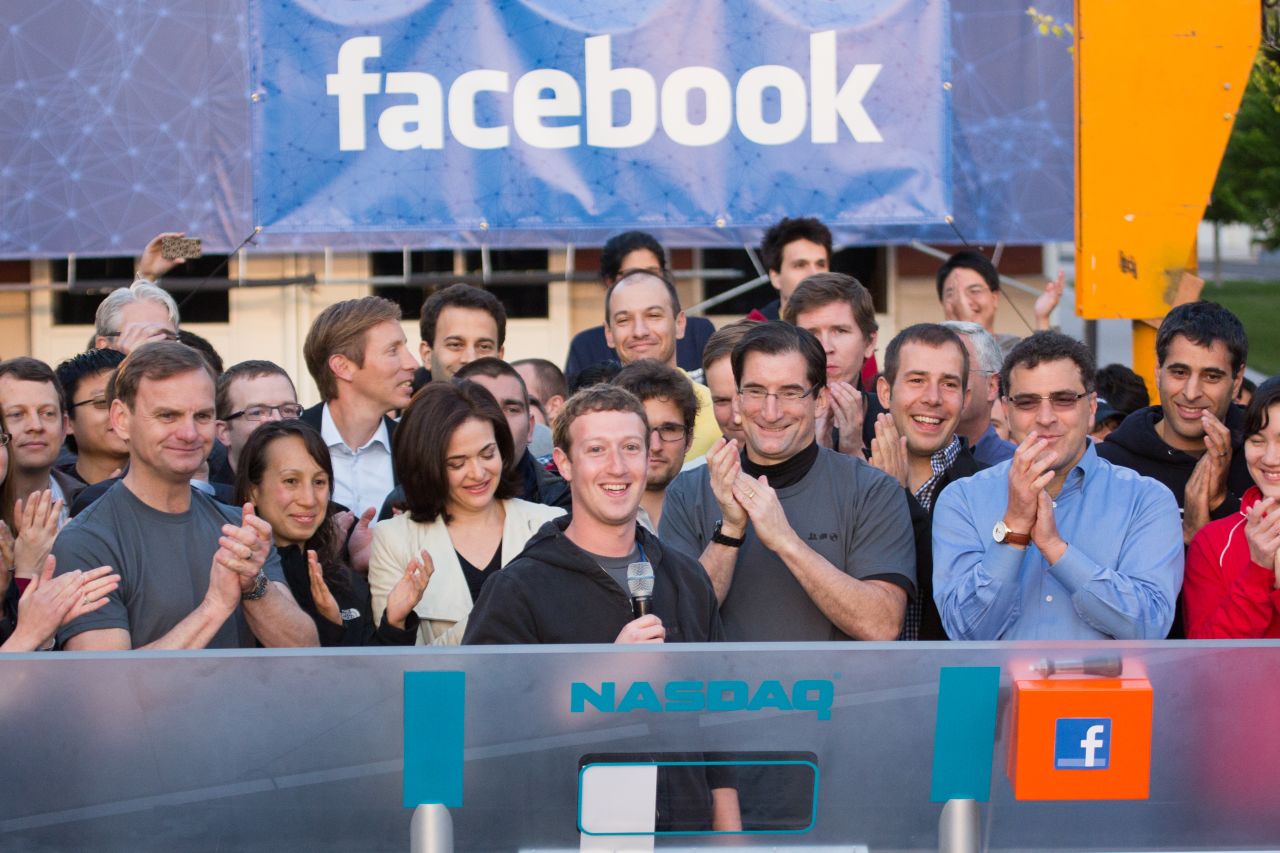Mark Zuckerberg's Facebook In The Age Of Trump

Table of Contents
The Rise of Misinformation and Political Polarization on Facebook during the Trump Era
The Trump years witnessed an explosion of misinformation and political polarization on Facebook, largely fueled by algorithmic amplification and a lack of robust content moderation. This section examines key events that exacerbated these issues, significantly impacting the 2016 and 2020 US presidential elections.
The Cambridge Analytica Scandal and its Implications
The Cambridge Analytica scandal, which broke in 2018, exposed how the political consulting firm harvested the personal data of millions of Facebook users without their consent. This data was then used to target voters with highly personalized, and often manipulative, political advertising.
- Key Events: A whistleblower revealed how Cambridge Analytica obtained data through a personality quiz app. Facebook faced intense scrutiny and investigations from various regulatory bodies worldwide.
- Consequences: Facebook faced significant reputational damage, leading to user distrust and calls for stricter data privacy regulations. Mark Zuckerberg's testimony before Congress further amplified public concern.
- Long-term effects: The scandal highlighted the vulnerability of user data and the potential for misuse in political campaigns, impacting trust in social media platforms and influencing future data privacy regulations like GDPR.
The Spread of Fake News and its Influence on the 2016 and 2020 Elections
Facebook's algorithms, designed to maximize engagement, inadvertently amplified the spread of fake news and propaganda during both the 2016 and 2020 elections. These false narratives often targeted specific demographics and fueled political division.
- Role of Facebook: The platform's algorithm prioritized sensational content, regardless of its veracity, leading to the rapid dissemination of misleading information. The lack of effective fact-checking mechanisms compounded the problem.
- Facebook's Response: While Facebook implemented measures to combat fake news after the 2016 election, their effectiveness remained a subject of ongoing debate. Critics argue these measures were insufficient to prevent the continued spread of disinformation.
- Examples: The Pizzagate conspiracy theory, false claims about voter fraud, and numerous fabricated stories circulated widely on Facebook, influencing public opinion and potentially swaying election outcomes.
The Amplification of Extremist Voices and Hate Speech
Facebook's algorithms also contributed to the amplification of extremist voices and hate speech, creating echo chambers and fostering online radicalization. This issue raised serious concerns about the platform's role in societal harm.
- Algorithmic Amplification: The algorithms, designed to increase engagement, inadvertently boosted extremist content, exposing users to harmful ideologies and misinformation.
- Zuckerberg's Approach: Zuckerberg's approach to content moderation has been criticized for being reactive rather than proactive, struggling to keep pace with the rapid evolution of online extremism.
- Examples: Various extremist groups, including white supremacists and anti-vaccine groups, utilized Facebook to recruit members, spread propaganda, and organize events.
Zuckerberg's Testimony before Congress and the Growing Calls for Regulation
Mark Zuckerberg's appearances before Congress following the Cambridge Analytica scandal and other controversies highlighted the growing calls for increased social media regulation. These hearings revealed significant criticisms of Facebook's practices and spurred debates about the future of online platforms.
Key Moments and Criticisms during Congressional Hearings
Zuckerberg faced intense questioning from lawmakers regarding Facebook's data privacy practices, its role in the spread of misinformation, and its handling of hate speech.
- Specific Questions: Senators and Representatives grilled Zuckerberg on topics ranging from data security to the algorithms that drive content distribution.
- Zuckerberg's Responses: His responses often focused on the company's efforts to improve its policies and practices, while acknowledging the challenges involved.
- Public Reaction: The hearings fueled public debate about the power of tech companies and the need for stricter regulation.
The Debate Surrounding Section 230 and its Implications for Facebook
Section 230 of the Communications Decency Act provides legal protection to online platforms from liability for user-generated content. The debate surrounding Section 230's reform is directly relevant to Facebook's liability for content posted on its platform.
- Relevance to Facebook: Section 230 shields Facebook from legal responsibility for the vast amount of content shared by its users.
- Arguments for and against reform: Proponents of reform argue that Section 230 allows platforms to avoid accountability for harmful content. Opponents argue that changing it could stifle free speech and innovation.
- Key legal aspects, political implications, and potential consequences: Reform proposals could drastically alter Facebook's business model and its approach to content moderation.
The Growing Movement for Increased Social Media Regulation
The controversies surrounding Facebook during the Trump era significantly accelerated the movement for increased social media regulation. Numerous proposals aim to address issues of misinformation, hate speech, and data privacy.
- Proposed Regulations: Proposals range from stricter content moderation policies to the implementation of independent oversight boards for social media platforms.
- Potential Impact on Facebook's Business Model: Increased regulation could significantly impact Facebook's revenue streams and its ability to operate as it currently does.
- Examples of proposed regulations and their potential effects: Regulations might require greater transparency in algorithmic decision-making, stricter penalties for violations, and increased user control over data.
The Long-Term Impact on Facebook's Reputation and Business Model
The Trump era left a lasting mark on Facebook's reputation and business model, forcing the company to confront its ethical responsibilities and adapt to a changing regulatory landscape.
The Damage to Facebook's Credibility and Trust
The repeated controversies eroded public trust in Facebook, impacting user engagement and the company's overall reputation.
- Impact on Public Image: Facebook's image shifted from that of a revolutionary tech company to one grappling with ethical challenges and regulatory scrutiny.
- Erosion of User Trust: Users became increasingly wary of sharing personal data and engaging with the platform due to concerns about misinformation and privacy.
- Specific Events: The Cambridge Analytica scandal, the spread of fake news, and the amplification of hate speech all contributed to the decline in trust.
Changes in Facebook's Policies and Practices
In response to criticism, Facebook implemented several changes in its policies and practices, aiming to improve content moderation and data privacy.
- Policy Changes: The company increased its investment in fact-checking initiatives, developed new tools to detect and remove hate speech, and improved its data privacy measures.
- Effectiveness of Changes: The effectiveness of these changes remains a topic of debate, with critics arguing they are insufficient to address the underlying issues.
- Examples of policy changes and their impact: Increased transparency in ad targeting, improved tools for users to report harmful content, and enhanced fact-checking partnerships are some examples.
The Future of Facebook in a Post-Trump World
The challenges and opportunities facing Facebook in the post-Trump era are significant. The company will need to continue adapting to evolving regulations and user expectations.
- Challenges: Maintaining user trust, combating misinformation, and navigating a complex regulatory environment remain major challenges.
- Opportunities: Facebook can leverage its vast reach to promote positive social change, invest in ethical AI, and further develop tools to ensure platform safety.
- Predictions: Increased regulation, greater transparency, and a stronger focus on combating misinformation are likely in the future.
Conclusion
This article explored the intricate relationship between Mark Zuckerberg's Facebook and the Trump presidency, highlighting the rise of misinformation, political polarization, and the subsequent calls for greater regulation. The Trump era exposed critical vulnerabilities within Facebook's platform and significantly impacted its reputation and business model. Understanding Mark Zuckerberg's Facebook in the Age of Trump is crucial for navigating the complexities of social media and its impact on democracy. Continue exploring this critical topic and stay informed about the evolving landscape of online platforms and their influence on society.

Featured Posts
-
 Us Tariffs French Minister Pushes For Stronger Eu Retaliation
May 10, 2025
Us Tariffs French Minister Pushes For Stronger Eu Retaliation
May 10, 2025 -
 Ashhr Mdkhny Krt Alqdm Qaymt Mfslt Balasmae Walqss
May 10, 2025
Ashhr Mdkhny Krt Alqdm Qaymt Mfslt Balasmae Walqss
May 10, 2025 -
 Strictly Fallout Wynne Evans No Longer Featured In Go Compare Ads
May 10, 2025
Strictly Fallout Wynne Evans No Longer Featured In Go Compare Ads
May 10, 2025 -
 Vegas Golden Knights Even Series Against Wild With Barbashevs Overtime Goal
May 10, 2025
Vegas Golden Knights Even Series Against Wild With Barbashevs Overtime Goal
May 10, 2025 -
 Stock Market Update Sensex And Nifty Surge Adani Ports Gains Eternal Declines
May 10, 2025
Stock Market Update Sensex And Nifty Surge Adani Ports Gains Eternal Declines
May 10, 2025
